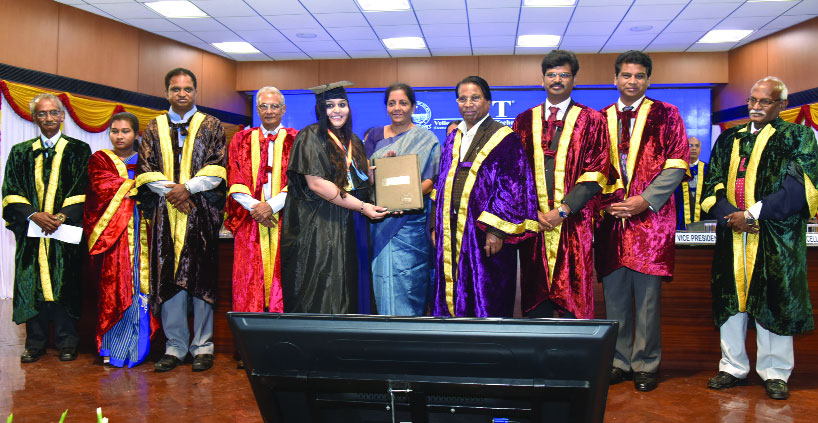The Defence Minister Nirmala Sitharaman has called upon the engineering students to use the latest technology and skills to help India face cyber war in future.
Delivering the convocation address at the 33rd Annual Convocation of the Vellore Institute of Technology at the VIT campus in Vellore, Sitharaman, said: “In future, wars will be fought less on the borders but more in cyber space. Today, the country is facing the threat of cyber war with its far-reaching ramifications on national security. Besides, one’s personal security and interests were also threatened by cyber crime. The students, who are qualifying today in science and technology, will have to start working to see how technology can be adopted to tackle these twin threats.”
The Defence Minister highlighted that the Indians have imbibed the entrepreneurial spirit genetically from their forefathers dating back to the period when the Nalanda University was flourishing. “The British colonial era saw the emergence of English education which was intended to educate the Indian people to work as clerks and serve their British masters. This trend which started during the colonial rule continued for the 50 years after Independence. The Narendra Modi Government wants to break the chain which fettered the students by forcing them to take up salaried jobs instead of starting their own business. The Government has initiated the Make In India programme to encourage the engineers to go in for start-ups,” she said.
The Minister was making these remarks in response to the request of Dr G Viswanathan, chancellor of VIT, to help remove the chains which fettered the growth of education. She agreed with the view that the regulations in the education sector too need to be relaxed.
Dr Viswanathan said that after the liberalisation, privatisation and globalisation regime in 1991-96, all sectors were de-regulated. But de-regulation has not happened so far in the education sector. He requested the Defence Minister to help in the de-regulation of the education sector.
“Though India had the potential to become a hub of international education, it contributed just one per cent of the international students throughout the world. On the other hand, lakhs of students from India were going abroad for higher education, and the Government of India was spending Rs 75,000 crore worth of foreign exchange annually on these students,” the chancellor pointed out.
Dr Viswanathan said that VIT was ranked 13th among the various engineering institutions in India under the National Institutional Ranking Framework (NIRF) of the Ministry of Human Resources Development, and first among the private engineering institutions.
“A total of 39,000 students were studying in the four campuses of VIT in India. A total of 3,300 students were recruited through campus placements in 2017-18. Till date, 2600 students were placed through campus recruitment in 2018-19,” he said.
The guest of honour, Viji Santhanam, MD, Brakes India Private Limited and chairman, Sundaram Finance Limited, Chennai, said: “While at present, a majority of India’s population was below the age of 27 years, this demographic dividend will start declining by 2040. In order to propel economic growth, India has to make good use of this competitive advantage which it can enjoy only for another 20 years,” he said who later distributed the gold medals and degree certificates to 54 candidates.
A total of 6,277 candidates received their degree certificates at the convocation. Dr Anand A Samuel, Vice Chancellor, VIT welcomed the gathering. Sankar Viswanathan, Dr Sekar Viswanathan and GV Selvam, VP, and Kadambari S Viswanathan, assistant VP, Pro VC, Dr S Narayanan, Dr N Sambantham, registrar Dr K Sathiyanarayanan of VIT participated.




















